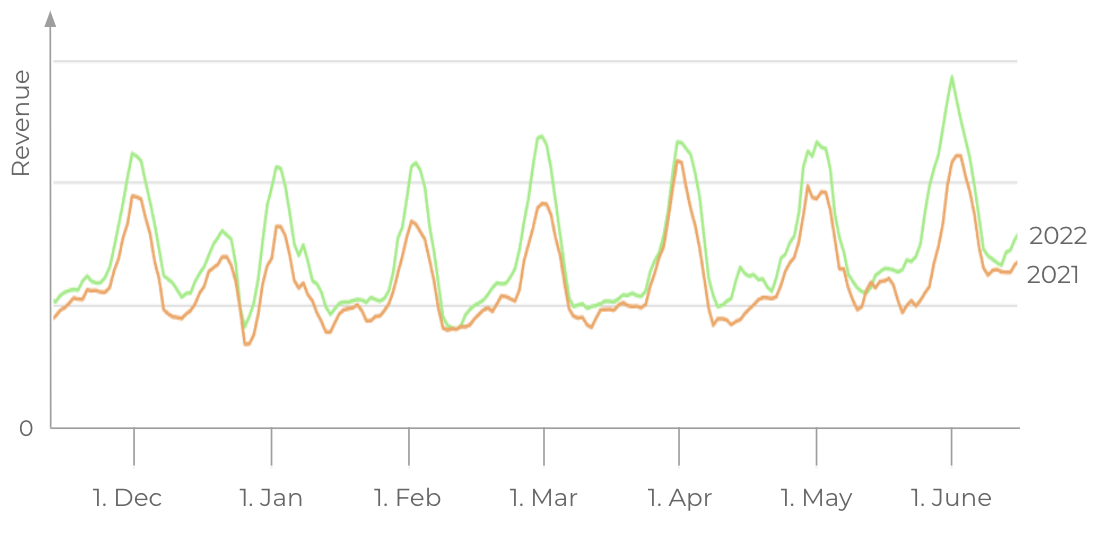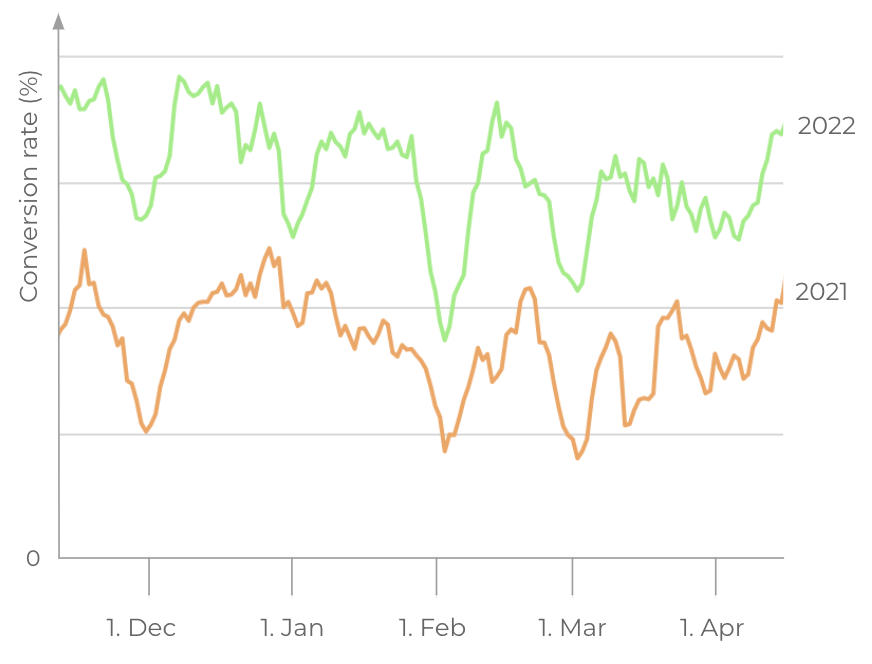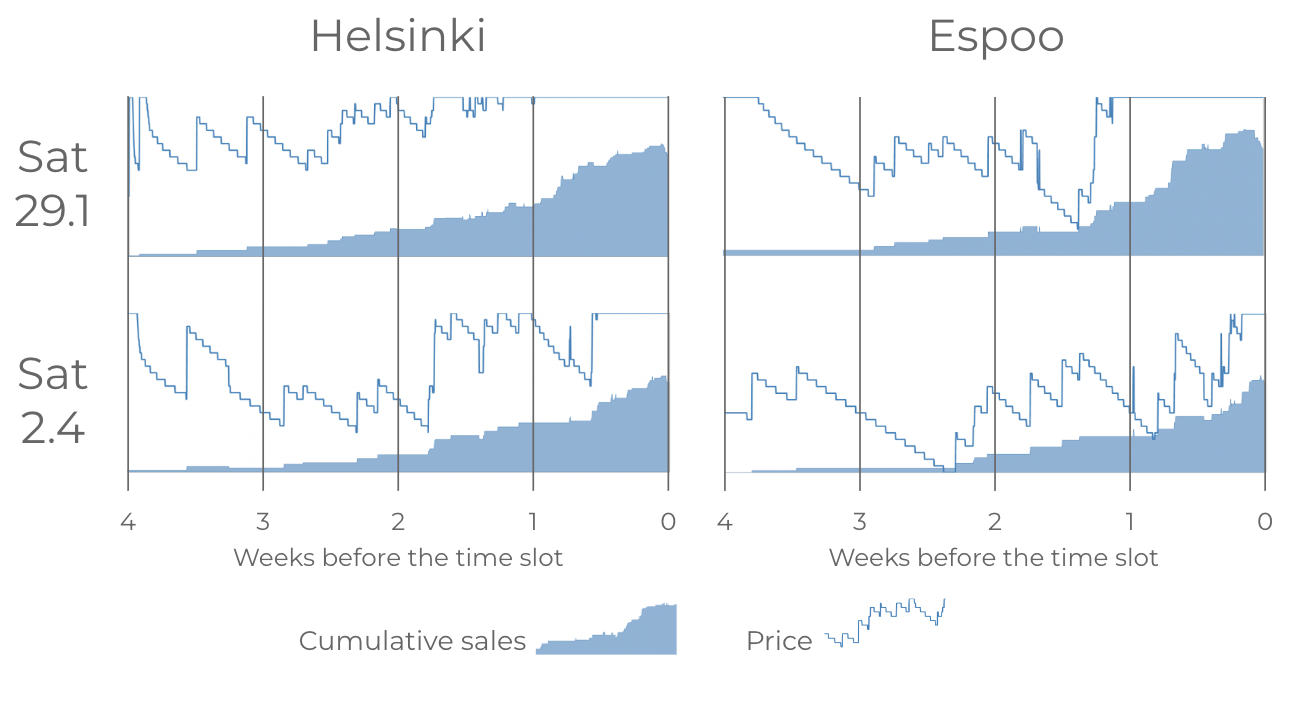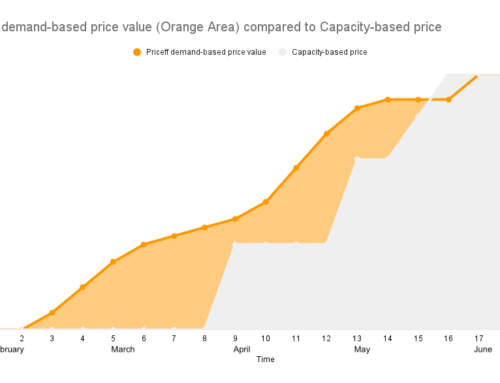Pakuovelle.com is Finland’s largest rental company dedicated only to van rental. They started using Priceff’s dynamic pricing solution in November 2021 and achieved great results: their revenue increased by 18%, their rental hours by 29% and their conversion rate by 20%.
The problem
Van rental is a business where a big portion of bookings take place at the turn of the month when people typically move. The capacity for these times is often sold out too cheaply. In the middle of the month, however, capacity is often unused due to less demand. Unused capacity leads to missed profit, especially in rentals where unused time slots are “perishable goods” and where the variable costs of the business are low. The same goes for weeks and even days. Weekdays usually have lower demand than weekends, and nighttime usually has lower demand than daytime.
Priceff’s solution
Pakuovelle and Priceff identified that dynamic pricing is a great solution to this problem. When the demand is low the price is automatically decreased to get more sales. When the demand is high the price is automatically increased to maximize the revenue for these time slots. This levels out demand over the weeks, months, and days, and increased Pakuovelle’s revenue by 18% and rental hours by 29%.
Priceff’s algorithm continuously calculates optimal prices for all Pakuovelle’s nearly 200 vans across Finland. The price is updated once per hour for every open time slot in every location for the next 3 months. The prices are adjusted automatically 24/7 without any manual work.
Pakuovelle actively informs clients that they use dynamic pricing, and we’ve found that customers understand dynamic pricing well if it is clearly communicated. Customers also benefit when the popular time slots aren’t sold out too quickly, and when there are slots available that are more affordable than before.
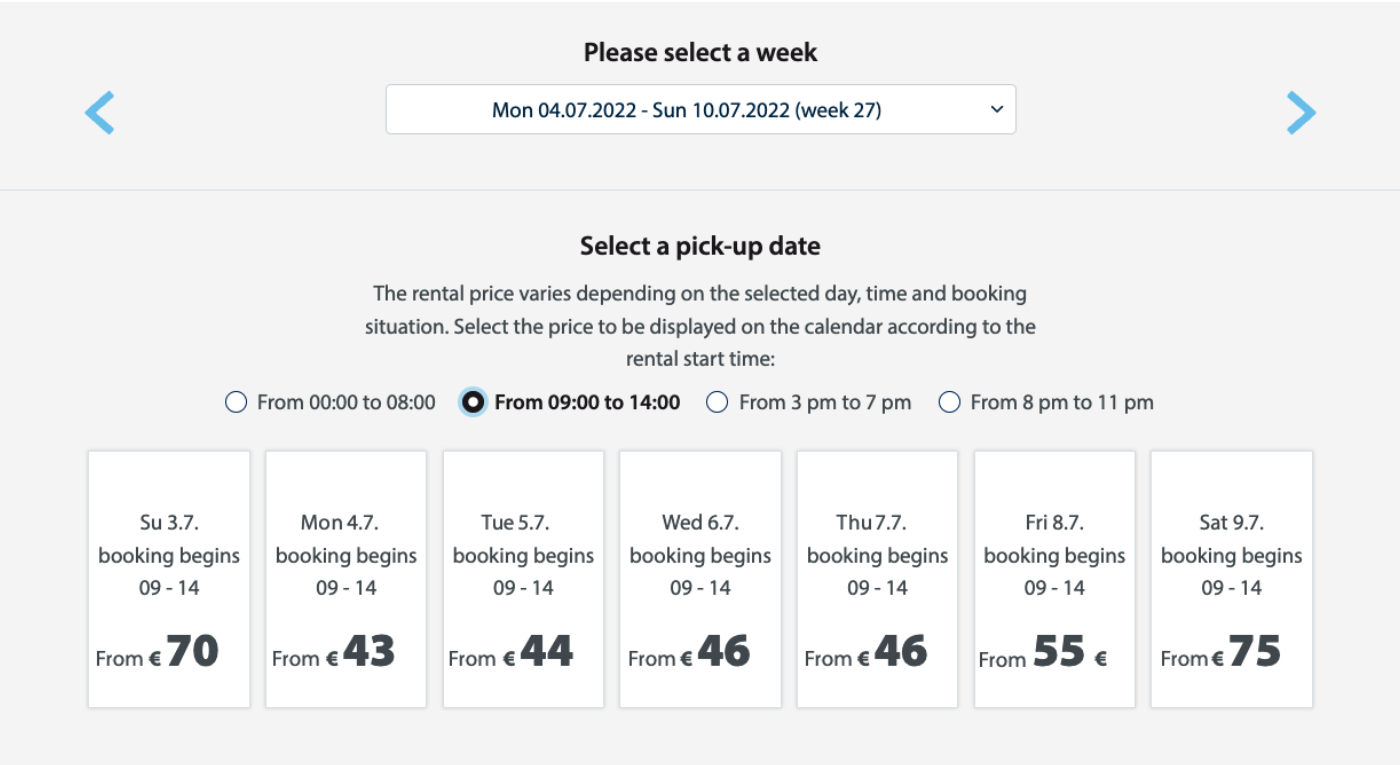
Image from Pakuovelle’s booking page. They communicate clearly to their customers that they use dynamic pricing.
The results
Increased rental hours by 29% and grew market share
The graph below highlights the increase in total van bookings (in hours) after Priceff’s dynamic pricing was implemented. It is compared to the same months the previous year due to significant seasonal variation in demand. Note that especially the less popular times in the middle of the month have had big increases in proportion to the previous year, due to the automatically lowered prices. These lowered prices attracted customers to Pakuovelle instead of their competitors, which helped them grow their market share. The volumes for the peaks have also increased due to the continuously optimal price level (which was slightly lower than before) and due to the increased conversion rate, which is explained below.
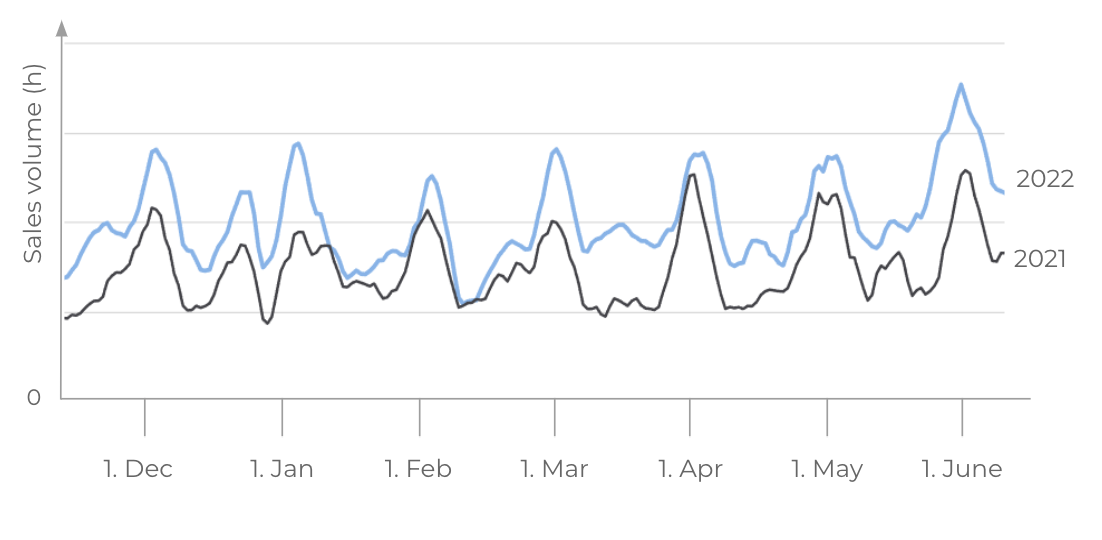
Increased revenue by 18%
The graph below shows the total revenue after Priceff’s dynamic pricing was implemented compared to the previous year. Due to the demand-based and continuously optimal prices, the total revenue increased even though the average price level was slightly lower than before. Most of the revenue increases came from the peaks when the customers that chose to stick with the high-demand slots paid more for them. The revenue also increased when there was less demand in the middle of the month, despite the lowered prices for these times.
Increased conversion rate by 20%
The graph below shows the conversion rates. That is, the percentage of customers who booked a van when visiting the website. The increase compared to the 5 previous months was 20% and compared to the same months the previous year 38%. This clear increase can be explained by the fact that prices always match the customer demand in real-time, especially when demand is low. This makes the customers more likely to book a slot. When visiting Pakuovelle’s website there is also a wide range of different prices available for different time slots, due to their unequal popularity. This allows the customer to choose the slot that suits them best, which increases the conversion rate and levels out capacity utilization.
More accurate results than if done by a human being
The graphs below show the dynamic prices and the cumulative bookings for 2 different Saturdays at the end of the month and 2 different locations starting 4 weeks before the bookable slot. The demand was unique for each day and location, and predicting it perfectly would have been impossible for a human being. The algorithm, however, managed to adjust the prices automatically and very accurately in real-time based on the current demand of those days and locations.
The implementation process
The entire implementation project was conducted in 4 weeks, in the following steps:
- Designing the initial process for implementation and the pricing model & structure
- Building the integration and the dynamic price updating logic to the reservation system of Pakuovelle.com. This took two weeks.
- Testing and validating the data to make sure everything worked as intended.
- Business configuration. Pakuovelle gave the algorithm their price limits (the minimum and maximum prices between which the price fluctuates), their start prices, and sales targets. Priceff conducted a data analysis to set advanced parameters that steer pricing behavior. The configuration usually needs a little trimming to achieve the best results. When these were set up, we were ready to go live!
- Early usage. Pakuovelle.com has needed only a few small adjustments to the configuration during the first year of usage, and still the results are phenomenal.
“This has been fantastic! We have greatly increased our market share and absolutely achieved the goals that we set when we started dynamic pricing. We now offer very affordable prices during silent hours, our revenue has increased and we also gain a higher price during peak hours”, says Mikko Erkkilä, the CEO of PakuOvelle.com.
Hear the story from Mikko Erikkilä on YouTube.
Contact us to discuss how your company can benefit — it usually takes only weeks to set up a live test!
Heikki Lummaa
CEO, Partner heikki.lummaa@priceff.com +358 400 626 893

